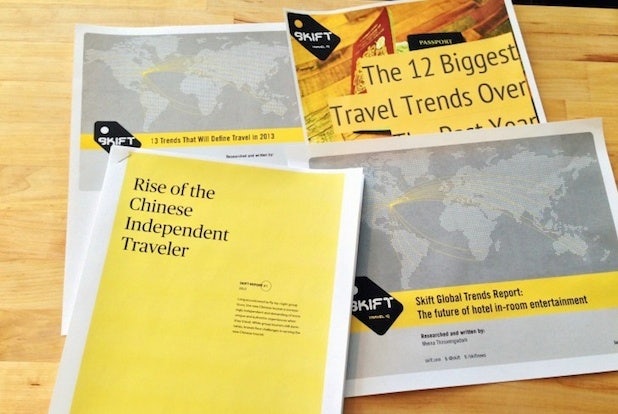
Skift's new "Rise of the Chinese Independent Traveler" report. (Skift)
China’s affluent younger generation is likely to be traveling the world at record levels in the years to come, but not from the seat of a tour bus, according to a new report.
Travel website Skift’s recent research on the “Rise of the Chinese Independent Traveler” concludes that young members of China’s middle class are dramatically changing the travel industry, opting for independent travel in lieu of the standard group tours of their parents’ generation. The report argues that the significance of this demographic shift is already being felt in the fact that the popularity of group tours is declining and independent travel is rising, mainly as a result of younger travelers’ changing preferences.
Joining a tour group has long been a major form of travel for China’s outbound tourists, who opt for packages that cram in as many tourist spots as possible in a small amount of time. Shopping is also a huge part of the itinerary, as these tours are known for bringing busloads of Chinese visitors straight to the doorsteps of luxury goods stores, where their spending has buoyed the global luxury industry over the past several years.
However, this system is set to change dramatically as China’s outbound travelers are becoming more worldly and confident—especially the younger generation. According to the report, the importance of group tourism is historically connected to the fact that outbound travel used to be heavily restricted by the Chinese government, but now that outbound tourism is encouraged, more evidence is pointing to the fact that the number of independent tourists is growing rapidly.
“I think that group tours are there as a result of restrictions and the early stage of China's emergence,” said report author Vincent Trivett. But, “as Chinese become more comfortable with foreigners and their languages and more familiar with travel, they will be more willing to take matters into their own hands,” he said.
Independent travelers like to control their own itinerary, and care more about having unique cultural experiences than about hitting up the most typical tourist spots. According to Trivett, “Even if the proportion of independent to group tourism doesn't change, we will definitely see more of both,” and when it comes to independent tourism, when travelers “post their good experiences on their blogs, this will grow even further.”
One main factor driving this independence boom is demographics. The vast majority of China’s independent tourists—74.4 percent—are between the ages of 25 and 44, according to the report. The millennial generation in particular is driving the rising popularity of independent tourism. Members of this generation are likely to have already been on a bus tour with their parents, says the report, and find group travel “banal”. According to Trivett, “They don't appreciate being herded around. The younger set that grew up affluent don't get the same joy out of a frenetic jaunt across Europe that visits 5 countries in 10 days.”
Just because they aren’t going to be bussed straight to the luxury shops doesn’t mean they’re going to stop shopping altogether. According to McKinsey, the balinghou generation, or those born after 1980, have conveyed more brand loyalty, more willingness to “trade up” for higher-quality goods, and more confidence about their personal income growth than the older generations. The key for luxury brands in the future will be to learn how to appeal to the distinctive characteristics of this this worldly and independent consumer group when they strike out on their own abroad.